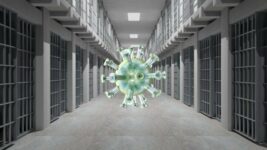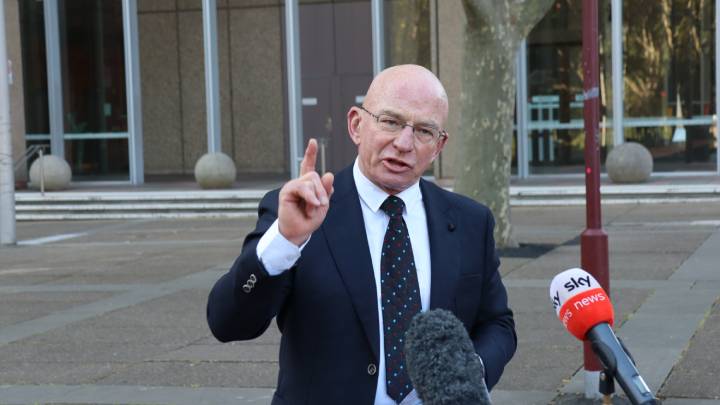Calls to Depopulate the NSW Prison System, as COVID Claims It First Inmate

NSW Health announced on Monday that the first COVID casualty relating to the Parklea Correctional Centre virus outbreak had occurred, as an unvaccinated man in his 60s, who had underlying health conditions, died at Concord Hospital due to an infection acquired at the privately run prison.
Since the onset of the pandemic in March 2020, prisoner advocates had been warning that COVID-19 had the potential to spread like wildfire throughout correctional facilities.
Yet, these warnings mainly went unheeded, until the Delta variant evaded security and made its way into the NSW system.
The deadly virus entered Silverwater and Parklea prisons in August. And due to a quarantine breach in the latter gaol, the virus took hold amongst the general population.
At its September peak, the COVID outbreak on the inside saw around 140 Parklea prisoners test positive, with at least 325 cases having been detected throughout the entire state corrections system.
In response to this outbreak amongst a then largely unvaccinated prisoner population, Justice Action launched legal proceedings, calling on the Corrective Services NSW commissioner to release inmates with compromised health under a tailored emergency law.
But as the pandemic response in the general community has now morphed into living with the virus, so too has the class action taken on a new focus.
And the position now being argued is that, in the face of the virus, prison facilities must be depopulated in order for authorities to maintain their duty of care.

No freedom day inside
“The situation inside is appalling,” Justice Action coordinator Brett Collins told Sydney Criminal Lawyers. “Everyone inside the prisons are in disarray. Many have been locked in their cells for weeks.”
“The current situation is that people received into prisons are moved through the remand centre at Silverwater, where they remain in quarantine for 14 days,” he explained. “And anyone who is then moved out of this – say to Parklea – are then placed in quarantine for another7 days.”
But what this means is that anyone entering the system is effectively held in prolonged solitary confinement without any support. And Collins outlines there’s no medical evidence supporting the need for such long isolation that’s likely to result in ongoing mental health issues.
The Mandela Rules define prolonged solitary confinement as being held alone for more than 22 hours a day in excess of 15 consecutive days. And these UN advised standard minimum rules for inmates classify prolonged solitary confinement as torture and stipulate its use should be prohibited.
“They’ve done it as it seems a way to ensure the infection is not transmitted into prisons, where, in fact, it’s a total abuse of prisoners themselves,” continued Collins, adding that it’s more likely the over 3,000 prison staff coming and going on a daily basis will carry the virus in.
A preventative injunction
NSW barrister Louise Goodchild is leading the Justice Action case that now seeks a quia timet injunction on breach of duty of care. A quia timet is a judicial order that restrains a wrongful act that is threatened or is at risk of occurring prior to it taking place.
“What has become clear is that our action is arguing for a depopulation of prisons on health grounds,” Collins explained. “COVID Alpha became Delta, which will become something else shortly, and the right to duty of care is fundamental to the power of custody.”
The argument is that as Corrective Services NSW cannot ensure social distancing with the aim of preventing COVID transmission within prison cells, then the authorities are breaching their required duty of care.
The legal action will build upon the May 2020 Victorian Supreme Court case Rowson versus the Department of Justice and Community Safety, which saw a 52-year-old inmate, with compromised health, seeking temporary release from Port Phillip Prison due to the pandemic onset.
Justice Timothy Ginnane found a breach of duty of care had occurred as no risk assessment of the prison setting had taken place in relation to COVID-19. However, the inmate wasn’t released, as the virus had not entered into the Victorian prison system at that time.
But this is markedly different to the current situation in NSW. As Collins points out, the virus has already been circulating in this state’s system, and as evidenced this week, inmates are at risk of catching the virus and dying, and further, if they do survive, there are the effects of long COVID.
And as the October 2021 NSW Supreme Court case R versus Zerafa suggests, during the peak of the recent Parklea Correctional Centre outbreak, uninfected inmates were knowingly locked down with COVID positive prisoners in a special section of the facility reserved for virus carriers.
So, as with the initial class action, the current case continues to call upon the CSNSW commissioner to release low-risk inmates, who are vulnerable to the virus and soon eligible for parole, under the emergency power in section 276 of the Crimes (Administration of Sentences) Act 1999 (NSW).
An ongoing risk
Justice Action has been advised that at present, inmates that had been infected inside local prisons were isolated and have now recovered. And besides this week’s death linked to Parklea, there has also been another fatality connected to a juvenile facility.
“That doesn’t suggest for a moment that the infection is not continuing to move through the prisons,” the inmate rights’ advocate added. “The situation will continue to be ongoing and dangerous for people in prisons who are locked in areas without the ability to socially distance.”
Some scientists have warned that humanity is now facing an age of pandemics. And similarly, Collins suggests it’s likely that over the coming years and decades more diseases will be running through the system, and without adequate room in cells, authorities will be in breach of their duty of care.
“The most essential part of this is that prisoners statistically have poor health. Many of them have immune systems which are compromised,” Collins concluded. “And they are given very poor health assistance within the prisons.”







